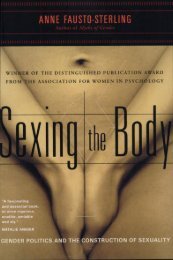C. Wiebes - Intelligence en de oorlog in Bosnië 1992-1995. De rol van de inlichtingen- en veiligheidsdiensten - Engels
C. Wiebes - Intelligence en de oorlog in Bosnië 1992-1995. De rol van de inlichtingen- en veiligheidsdiensten - Engels
C. Wiebes - Intelligence en de oorlog in Bosnië 1992-1995. De rol van de inlichtingen- en veiligheidsdiensten - Engels
- No tags were found...
You also want an ePaper? Increase the reach of your titles
YUMPU automatically turns print PDFs into web optimized ePapers that Google loves.
9still active staff of <strong>in</strong>tellig<strong>en</strong>ce and security services, but also responsible m<strong>in</strong>isters, politicians, diplomatsand officials that acted as recipi<strong>en</strong>ts of <strong>in</strong>tellig<strong>en</strong>ce products concern<strong>in</strong>g Bosnia.Inevitably, these one hundred off-the-record <strong>in</strong>terviews did have consequ<strong>en</strong>ces for therefer<strong>en</strong>ces of this study. This is why <strong>in</strong> the acknowledgem<strong>en</strong>t of sources, this study regularly has toresort to refer<strong>en</strong>ces such as ‘Confid<strong>en</strong>tial <strong>in</strong>terview’. 3 Staff of foreign <strong>in</strong>tellig<strong>en</strong>ce and security serviceswere prepared to speak to the NIOD on condition that their id<strong>en</strong>tities were protected <strong>in</strong> view ofprivacy consi<strong>de</strong>rations, because disclosure of their names and id<strong>en</strong>tities could consi<strong>de</strong>rably impe<strong>de</strong> theirwork as analysts or operators <strong>in</strong> the future, or make it completely impossible, or because the prevail<strong>in</strong>glegislation <strong>in</strong> their country did not permit it. Anonymity was promised by the NIOD to a large numberof curr<strong>en</strong>t and former staff of services <strong>in</strong> the Netherlands and other countries for reasons of their own.It was therefore necessary to opt for the footnote form that has be<strong>en</strong> used. The most importantconsi<strong>de</strong>ration <strong>in</strong> mak<strong>in</strong>g this choice was that the ma<strong>in</strong> issue was to reconstruct a g<strong>en</strong>eral picture and notto establish the specific <strong>in</strong>flu<strong>en</strong>ce of <strong>in</strong>dividual people on the course of ev<strong>en</strong>ts.Moreover, there will be regular refer<strong>en</strong>ces to ‘Confid<strong>en</strong>tial <strong>in</strong>formation’. In g<strong>en</strong>eral, these arewritt<strong>en</strong> sources that the archive cont<strong>rol</strong>ler still consi<strong>de</strong>rs to be confid<strong>en</strong>tial, or docum<strong>en</strong>ts that havebe<strong>en</strong> passed to the NIOD privately, but which are still classified as ‘secret’ <strong>in</strong> the country concerned. Itgoes without say<strong>in</strong>g that every effort has be<strong>en</strong> ma<strong>de</strong> to verify the statem<strong>en</strong>ts by means ofsupplem<strong>en</strong>tary <strong>in</strong>terviews, background brief<strong>in</strong>gs or archival research wh<strong>en</strong>ever this was permissible.History is a discussion without <strong>en</strong>d. This is all the more true for the history of <strong>in</strong>tellig<strong>en</strong>ce andsecurity services, the archive material of which is subject to far longer terms than other governm<strong>en</strong>t archivematerial before disclosure is permitted. Researchers are g<strong>en</strong>erally not giv<strong>en</strong> access to catalogues, but haveto ask for rele<strong>van</strong>t docum<strong>en</strong>ts more or less <strong>in</strong> the dark. Also because of confid<strong>en</strong>tiality agreem<strong>en</strong>tsimposed on staff does <strong>in</strong>formation on <strong>in</strong>tellig<strong>en</strong>ce and security services reach researchers, andconsequ<strong>en</strong>tly the public, and th<strong>en</strong> after a much longer period than <strong>in</strong> other cases. Whereas, with history ofother k<strong>in</strong>ds, the picture of the subject g<strong>en</strong>erally changes <strong>in</strong> the course of time only as a result of new po<strong>in</strong>tsof view. In the case of the history of <strong>in</strong>tellig<strong>en</strong>ce and security services, new <strong>in</strong>formation can cont<strong>in</strong>ue tolead to an adjustm<strong>en</strong>t of the picture for far longer.Fortunately this was not the case <strong>in</strong> the research for this study where Dutch archives wereconcerned. 4 G<strong>en</strong>erous access was giv<strong>en</strong> to the archives by the Netherlands <strong>in</strong>tellig<strong>en</strong>ce and securityservices, especially the Military <strong>Intellig<strong>en</strong>ce</strong> Service (MIS), where the author was able to make<strong>in</strong><strong>de</strong>p<strong>en</strong>d<strong>en</strong>t selections. In a number of cases, more <strong>de</strong>tailed agreem<strong>en</strong>ts had to be ma<strong>de</strong> for specificsources. These cases were concerned with the unity of the Crown, the private lives of those <strong>in</strong>volvedand the Netherlands national security and security of the state. The latter po<strong>in</strong>t was especially rele<strong>van</strong>tto sources for the activities of Dutch and other <strong>in</strong>tellig<strong>en</strong>ce and security services. In particular, theid<strong>en</strong>tity of <strong>in</strong>formants, the orig<strong>in</strong> of <strong>in</strong>formation that was gathered by these services and therelationship of trust with foreign counterpart services had to be protected. An additional study of relatedarchives was also carried out <strong>in</strong> the Netherlands, for example at the Cab<strong>in</strong>et Office, Foreign Affairs,<strong>De</strong>f<strong>en</strong>ce, and Justice. Compreh<strong>en</strong>sive research <strong>in</strong> the archives of the United Nations <strong>in</strong> G<strong>en</strong>eva and NewYork sometimes yiel<strong>de</strong>d additional background material.It was also possible to speak freely with a large number of staff of the MIS and the NetherlandsNational Security Service (BVD). In addition to the usual privacy consi<strong>de</strong>rations, the fact thatdisclosure of their names and id<strong>en</strong>tities would impe<strong>de</strong> or make impossible their future work as analystsor operators with <strong>in</strong>tellig<strong>en</strong>ce and security services it was necessary to opt for referr<strong>in</strong>g to these morethan thirty <strong>in</strong>terviews as ‘confid<strong>en</strong>tial <strong>in</strong>terviews’.F<strong>in</strong>ally, we must not omit to m<strong>en</strong>tion that much <strong>in</strong>formation for this study was obta<strong>in</strong>ed fromop<strong>en</strong> sources. Historical research is usually based on all available literature on the ev<strong>en</strong>ts to be studied.At the start of this <strong>in</strong>vestigation, it was expected that a large number of publications would not be3 The number <strong>in</strong> brackets after the Confid<strong>en</strong>tial <strong>in</strong>terview note refers to the <strong>in</strong>terviewee concerned.4 <strong>De</strong> Graaff & <strong>Wiebes</strong>, Villa Maarheeze, pp. 9 - 25.





